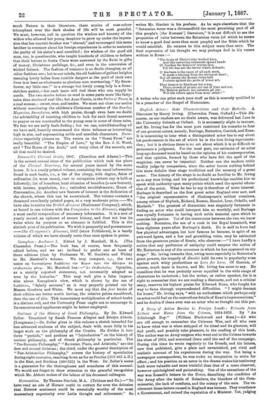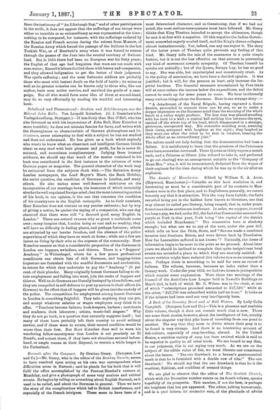A Story of Active Service in Foreign Lands : Extracts
from Letters sent Home from the Crimea, 1854-1856. By "An Edinburgh Boy." (William Blackwood and Sons.)—All who are old enough to remember the Crimean War, and all who care to know what war is when stripped of its tinsel and its glamour, will find profit, and possibly take pleasure, in the reading of this book. The author was an Army surgeon who went out to the Crimea towards the close of 1854, and remained there until the end of the campaign. Daring this time he wrote regularly to his friends, and his lettere, now first published, give a plain and unvarnished, yet vivid and realistic account of his experiences during the war. Not being a newspaper correspondent, he was under no temptation to write for effect ; and his position as an actor in the drama makes his testimony both more valuable and more truthful than that of a mere observer, however quicksighted and painstaking. One of the sensations of the war was Russell's letters to the Times, describing the condition of the Army after the battle of Balaclava, the blenders of the Com. missariat, the lack of comforts, and the misery of the men. The ex- citement these letters caused in England was intense. They overthrew a Government, and ruined the reputation of a Minister. Yet, judging from the testimony of "An Edinburgh Boy," and of other participators in the strife, it does not appear that the sufferings of our troops were either so terrrible or so extraordinary as was represented at the time ; nothing to be compared, for instance, with the sufferings endured by the Russian and French armies during the retreat from Moscow, of the Russian Army which forced the passage of the Balkans in the last Turkish War, or of Bourbaki's army when it was forced to retreat through the passes of the Jam into the neutral territory of Switzer- land. But in 1854 there had been no European war for forty years; the English of that age had forgotten that wars are not made with rose-water ; Russell's letters thrilled them with horror and compassion, and they allowed indignation to get the better a their judgment. War spells suffering ; and the most fortunate soldiers are probably those who meet with instant death on the field of battle ; its minor as well as its greater miseries can be known only to those who, like oar author, have seen active service, and survived the perils of a cam- paign. But all who would form some idea of them at second-hand, may do so very effectually by reading his truthful and interesting book.















































 Previous page
Previous page